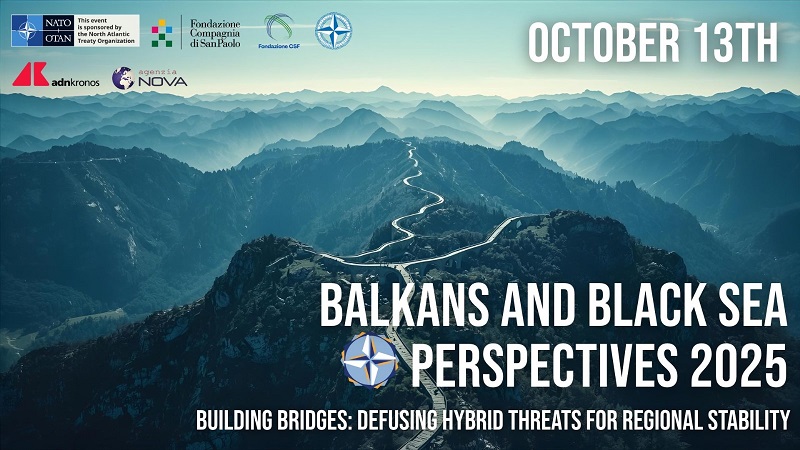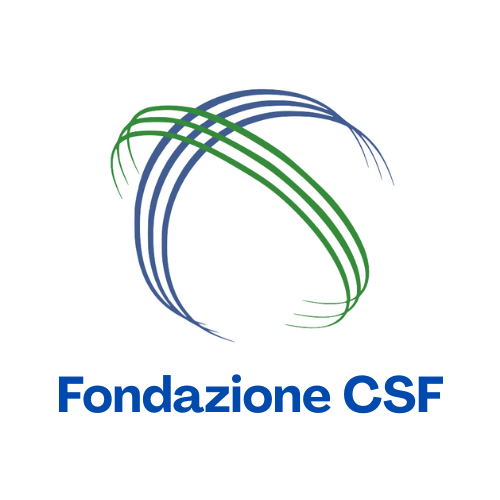Rome, 13 Ottobre 2025
Hotel Le Méridien Visconti, Via Federico Cesi 37
Working Language: English
Per partecipare, segui il link di registrazione qui sotto e compila il modulo di registrazione, indicando la tua partecipazione in presenza o virtuale ⇒ qui
Ogni partecipante, inclusi gli ospiti, deve compilare autonomamente il modulo di registrazione all'evento. Si prega di inoltrare questa email a qualsiasi ospite che desideri portare con te affinché possano registrarsi.
"I Balcani restano una priorità strategica per la NATO e l’UE, soprattutto in un momento in cui la guerra in Ucraina si intreccia con crisi regionali ancora irrisolte.
Nei Balcani si sta sviluppando una difficile fase silenziosa: la Bosnia ed Erzegovina affronta crescenti pressioni secessioniste, la Serbia vive fasi di instabilità politica e il Kosovo resta bloccato in un’impasse sulla sua sovranità. Queste tensioni, aggravate dalla criminalità organizzata, dalla corruzione e dalle minacce ibride, indeboliscono le istituzioni.
Fortunatamente, le prospettive di inclusione euro-atlantiche restano completamente aperte, offrendo ai paesi della regione un orizzonte di stabilità e cooperazione.
In questo scenario, la prossima Conferenza ad Alto Livello rappresenta una piattaforma cruciale per affrontare le sfide regionali e contrastare l’interferenza straniera."
Alessandro Minuto-Rizzo
Presidente della NATO Defense College Foundation
Programma in via di definizione (06/10/2025)
MONDAY, the 13th of October
15,30 – 15,50 Participants Arrival and Registration
15,50 – 16,00 | Welcome Remarks
Alessandro Minuto-Rizzo | President, NATO Defense College Foundation, Rome*
Catherine Bourdès | Director Academic Plans, Policy and Engagement, NATO Defense College, Rome*
16,00 – 16,20 | Opening Dialogue Session – The significance of the Dayton Accords
● Carl Bildt | Former Prime Minister and Minister for Foreign Affairs, Stockholm*
● Milica Marinović | Media Adviser to the President of Montenegro, Podgorica*
SESSION I 16,20 – 17,20
NATO Strategy in the Western Balkans: Achievements and Existing Challenges
This session will analyse NATO’s evolving strategic role in the region, providing the general backdrop for coordinated actions with the EU as strategic partner in order to meet present challenges and preserve actual achievements in the context of the most recent Summit.
Chair: Lara Jakes | Foreign Correspondent The New York Times, Rome*
● Peter Sørensen | EU Special Representative for the Belgrade-Pristina Dialogue and Western Balkans Regional Issues, European External Action Service, Brussels*
● Vessela Tcherneva | Deputy Director, European Council on Foreign Relations, Sofia*
● Zeynep Alemdar | Director, Foreign Policy Programme, EDAM, Istanbul*
Q&A Session
17,20 – 17,45 | Coffee break
17,45 – 18,00 | Keynote Speech
● Lana Prlić | Member of Parliament of the Federation of Bosnia and Herzegovina, Sarajevo*
Session II 18,00 – 19,00
Foreing Influences in the Region: Hybrid Threarts from Russia and China
The region faces hybrid threats from Russian influence, including disinformation campaigns and political destabilisation efforts, as well as Chinese coordinated campaigns in addition to economic leverage through strategic investments and infrastructure projects. What are NATO and the European Union’s strategies to counter these multifaceted threats? What are the key issues, and countries where hybrid operations need to be countered? How to strengthen Allied and partners’ coordination?
Chair: Solomon Passy | President, Atlantic Club of Bulgaria, Sofia*
Alina Bârgăoanu | Dean, College of Communication and Public Relations, National University of Political Studies and Public Administration, Bucharest*
Edward P. Joseph | Adjunct Lecturer, Senior Fellow, Foreign Policy Institute, John Hopkins, Washington D.C.*
Valery Perry | Senior Associate, Democratization Policy Council, Berlin*
Q&A Session
19,00 – 19,15 | Closing Remarks
Cecilia Piccioni | Director General for Political Affairs, Ministry of Foreign Affairs and International Cooperation, Rome
*Confirmed


 It
It  En
En 



